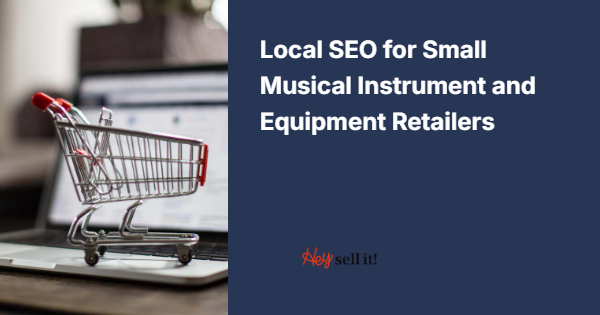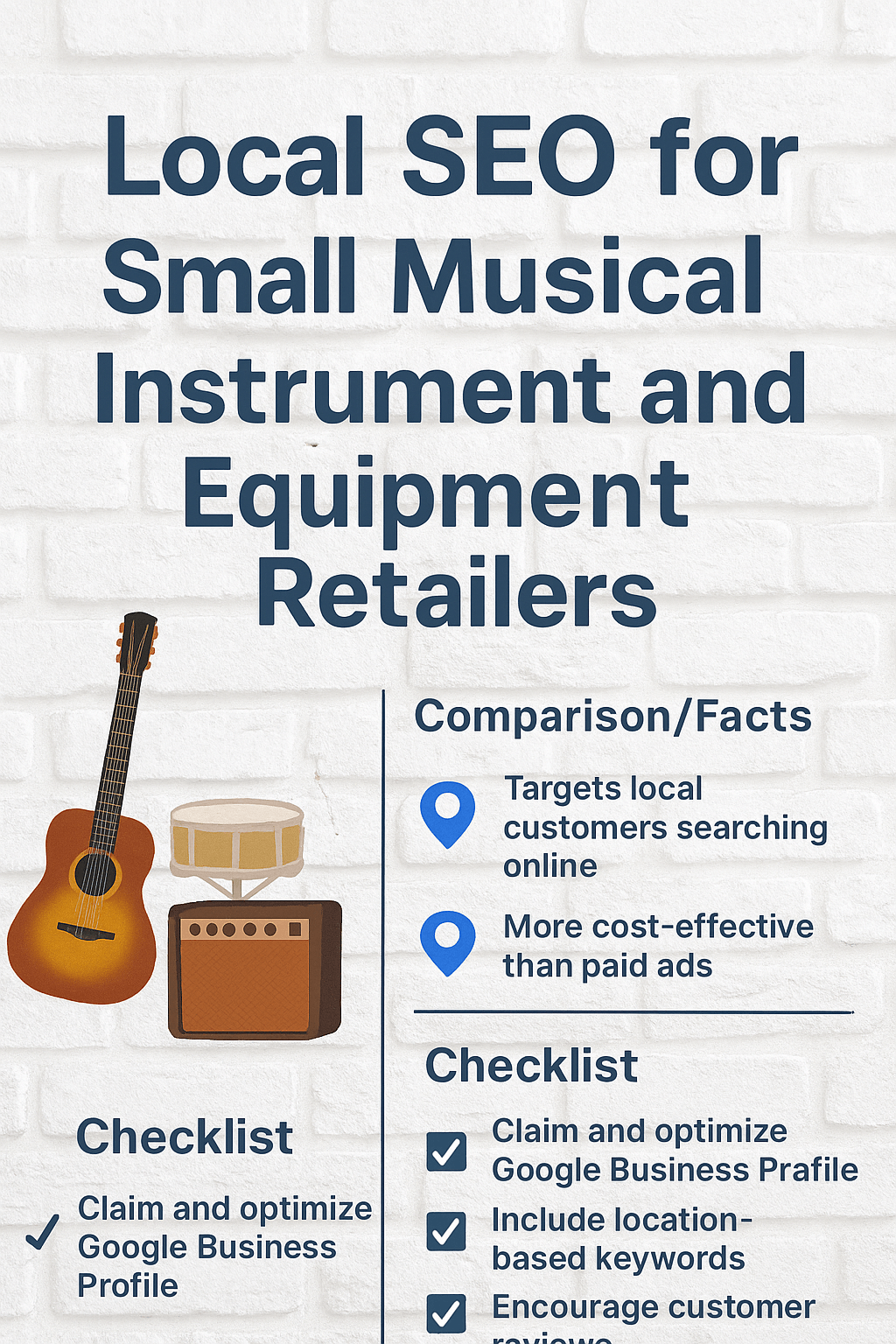Abdullah Usman
A passionate guitarist walks into Guitar Center, spends 20 minutes testing a $2,000 Fender Stratocaster, then pulls out their phone to buy it cheaper online. Sound familiar? If you’re a small musical instrument retailer, you’ve probably watched this scenario play out dozens of times. But here’s the thing – with the right local SEO strategy, that customer could be walking into YOUR store instead.
The music retail industry has seen a dramatic shift, with 73% of consumers now researching musical instruments online before making a purchase. Yet, 67% of these same customers prefer to test instruments in-person before buying. This creates a massive opportunity for local music stores that know how to leverage local SEO effectively.
Why Local SEO Matters More for Music Retailers Than You Think
The musical instrument retail landscape is brutal. Sam Ash closed 17 stores in 2020, and countless independent shops have shuttered their doors. But here’s what the survivors understand: local SEO isn’t just about being found online – it’s about becoming the go-to destination for musicians in your area.
Consider this: When someone searches “guitar repair near me” or “drum lessons [your city],” they’re not just looking for products – they’re seeking expertise, community, and immediate solutions. Local SEO services help you capture these high-intent searches that often lead to long-term customer relationships.
How Local Search Behavior Differs for Musical Instrument Shoppers
Musicians are a unique breed of consumers. Unlike typical retail shoppers, they often search for very specific terms like “vintage Marshall amp repair Nashville” or “left-handed bass guitar Denver.” This specificity makes local SEO incredibly powerful for music retailers.
Research shows that 78% of local mobile searches result in offline purchases, and this number jumps to 85% in the musical instrument category. Why? Because musicians need to hear, feel, and test instruments before committing to a purchase. Your local SEO strategy should capitalize on this behavior by targeting long-tail keywords that capture these specific intents.
What Makes Your Music Store’s Local SEO Different from General Retail
Musical instrument retailers face unique challenges that require specialized approaches. Unlike general retail stores, you’re dealing with seasonal demand spikes (back-to-school band instrument rentals), niche product categories (vintage synthesizers), and a customer base that values expertise over price.
Your ecommerce SEO strategy needs to account for the fact that musicians often research online but prefer to purchase locally. This means your website must serve as both a product catalog and a credibility builder. When someone searches “best violin shop [your city],” they’re not just looking for inventory – they’re seeking a partner in their musical journey.
The Foundation: Getting Your Google Business Profile Right
Your Google Business Profile is your digital storefront, and for music retailers, it’s absolutely critical. Start by claiming and verifying your profile, then optimize it with relevant categories like “Musical Instrument Store,” “Guitar Store,” and “Music Equipment Rental Service.”
Upload high-quality photos of your storefront, interior, and staff interacting with customers. Include images of your repair workshop if you offer instrument servicing – this builds trust and differentiates you from online-only competitors. Post regular updates about new arrivals, upcoming events, and special promotions.
Most importantly, encourage and respond to reviews. A study by BrightLocal found that 91% of consumers trust online reviews as much as personal recommendations. When a satisfied customer leaves a review saying “Found the perfect guitar here after trying five other stores,” respond with gratitude and specifics about their purchase.
Keyword Research That Actually Drives Foot Traffic
Generic keywords like “guitar store” won’t cut it in today’s competitive landscape. Your semantic SEO approach should focus on long-tail keywords that capture local intent. Use tools like Google Keyword Planner to identify terms like:
- “acoustic guitar repair [your city]”
- “piano lessons and sales [neighborhood]”
- “drum kit rental [your city]”
- “vintage guitar appraisal near me”
Don’t overlook brand-specific searches. If you’re an authorized dealer for popular brands like Yamaha, Fender, or Roland, create dedicated pages for “[Brand] dealer [your city]” searches. These often have lower competition and higher conversion rates.
Creating Location-Specific Content That Resonates
Content marketing for music retailers goes beyond product descriptions. Create blog posts about local music scenes, upcoming concerts, and artist spotlights. For example, if you’re in Austin, write about “5 Austin Musicians Who Started Their Journey at [Your Store Name]” or “The Best Venues for Live Music in Austin – A Local’s Guide.”
This approach serves multiple purposes: it establishes you as a community authority, generates natural backlinks from local music blogs and venues, and creates opportunities for local keyword integration. Your on-page SEO benefits when you naturally mention local landmarks, neighborhoods, and events.
Technical SEO Essentials for Music Retailers
Your website’s technical foundation directly impacts your local search performance. Ensure your site loads quickly – Google considers page speed a ranking factor, and impatient customers will bounce to competitors. Compress product images without sacrificing quality, and implement lazy loading for pages with extensive instrument catalogs.
Mobile optimization is non-negotiable. With 60% of local searches happening on mobile devices, your site must provide an excellent experience across all devices. This is particularly important for music retailers, as customers often search for “music store hours” or “guitar strings near me” while on the go.
Implement schema markup to help search engines understand your business. Use LocalBusiness schema to mark up your address, phone number, and hours. For product pages, use Product schema to display rich snippets showing prices, availability, and reviews directly in search results.
The Power of Local Citations and Directory Listings
Building consistent citations across relevant directories strengthens your local SEO foundation. Beyond general directories like Yellow Pages and Yelp, focus on music-specific platforms. List your business on:
- Reverb.com’s dealer directory
- Music industry associations
- Local chamber of commerce websites
- City tourism and business directories
Consistency is crucial. Ensure your business name, address, and phone number (NAP) are identical across all platforms. Even minor variations like “St.” versus “Street” can confuse search engines and weaken your local signals.
Leveraging Customer Reviews and Social Proof
Reviews are the lifeblood of local SEO for music retailers. Implement a systematic approach to collecting reviews across multiple platforms. After a successful sale or repair, send a follow-up email asking for feedback. Make it easy by including direct links to your Google Business Profile and other review platforms.
Respond to all reviews, both positive and negative. When addressing negative reviews, demonstrate your commitment to customer satisfaction. For example, if someone complains about a repair taking too long, explain your quality control process and offer to make it right.
Consider creating video testimonials from satisfied customers. A local guitarist showing off their newly repaired vintage Telecaster carries more weight than a dozen written reviews. These videos can be shared across social media platforms and embedded on your website.
Advanced Strategies: Beyond the Basics
Once you’ve mastered the fundamentals, consider advanced tactics that can set you apart from competitors. Implement geofencing campaigns to target customers near competitor locations. When someone visits Guitar Center, they might receive a notification about your store’s personalized service and competitive pricing.
Create location-based landing pages for nearby neighborhoods. If you’re in downtown Portland, create pages optimized for “music store Pearl District” or “guitar lessons Northwest Portland.” These hyper-local pages can capture customers who prefer shopping close to home or work.
Partner with local music teachers, studios, and venues. Cross-promotional opportunities not only generate referrals but also create valuable local backlinks. When the neighborhood guitar instructor links to your website, it signals to search engines that you’re a trusted local business.
Measuring Your Local SEO Success
Track metrics that matter for your business. Google Analytics and Google Search Console provide valuable insights into your local search performance. Monitor:
- Local search rankings for target keywords
- Google Business Profile views and actions
- Website traffic from local searches
- Conversion rates from local traffic
- Customer acquisition costs from organic search
Set up conversion tracking to understand which local SEO efforts drive actual sales. If your “guitar repair Denver” campaign generates 100 clicks but no conversions, you might need to adjust your landing page or offer.
Common Mistakes That Kill Local SEO Results
Many music retailers make critical errors that undermine their local SEO efforts. Avoid these pitfalls:
Inconsistent business information across platforms confuses search engines and potential customers. Use a spreadsheet to track your NAP information across all directories and update them simultaneously when changes occur.
Neglecting mobile optimization is particularly damaging for local searches. Test your website on various devices and connection speeds. If your product pages take more than three seconds to load, you’re losing potential customers.
Ignoring negative reviews or responding defensively damages your reputation. Address complaints professionally and publicly demonstrate your commitment to customer satisfaction.
How Professional SEO Services Can Accelerate Your Results
While DIY local SEO is possible, partnering with experienced SEO services can dramatically accelerate your results. Professional agencies understand the nuances of music retail SEO and can implement advanced strategies like competitor analysis, comprehensive SEO audits, and sophisticated link building campaigns.
Consider working with specialists who understand both ecommerce SEO and local search optimization. They can help you balance online sales with in-store traffic, ensuring your digital strategy supports your overall business goals.
Action Steps: Your 90-Day Local SEO Roadmap
Days 1-30: Foundation Building
- Claim and optimize your Google Business Profile
- Conduct a comprehensive SEO audit of your current website
- Research and compile a list of local keywords
- Begin collecting customer reviews
Days 31-60: Content and Technical Optimization
- Create location-specific content and landing pages
- Implement technical SEO improvements
- Build citations on relevant directories
- Start a regular content publishing schedule
Days 61-90: Advanced Strategies and Measurement
- Launch local link building campaigns
- Implement schema markup and rich snippets
- Begin tracking and analyzing performance metrics
- Refine strategies based on initial results
Local SEO for musical instrument retailers isn’t just about being found online – it’s about becoming the trusted local authority that musicians turn to for everything from their first guitar to their dream studio setup. By implementing these strategies consistently and measuring your results, you’ll build a sustainable competitive advantage that keeps customers coming back long after the initial sale.
The music retail landscape will continue evolving, but one thing remains constant: musicians value expertise, community, and the ability to try before they buy. Your local SEO strategy should reflect these values while ensuring you’re visible when customers are ready to make their next musical purchase.


